Deck 11: Fluids
Question
Question
Question
Question
Question
Question
Question
Question
Question
Question
Question
Question
Question
Question
Question
Question
Question
Question
Question
Question
Question
Question
Question
Question
Question
Question
Question
Question
Question
Question
Question
Question
Question
Question
Question
Question
Question
Question
Question
Question
Question
Question
Question
Question
Question
Question
Question
Question
Question
Question
Question
Question
Question
Question
Question
Question
Question
Question
Question
Question
Question
Question
Question
Question
Question
Question
Question
Question
Question
Question
Question
Question
Question
Question
Question
Question
Question
Question
Question
Question

Unlock Deck
Sign up to unlock the cards in this deck!
Unlock Deck
Unlock Deck
1/92
Play
Full screen (f)
Deck 11: Fluids
1
Which of the following are the SI units for specific gravity?
A) kg/m3
B) N
C) lb/ft3
D) m/s2
E) specific gravity has no units
A) kg/m3
B) N
C) lb/ft3
D) m/s2
E) specific gravity has no units
specific gravity has no units
2
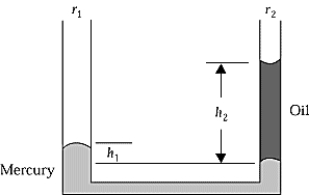 The left-hand side of an open U-tube has a radius r1 = 0.82 cm, and the right-hand side has a radius r2 = 0.41 cm. Mercury and oil are poured into the U-tube. The density of mercury is 13.6 g/cm3. The heights shown in the diagram are h1 = 3.50 cm and h2 = 57.3 cm. The density of the oil is approximately
The left-hand side of an open U-tube has a radius r1 = 0.82 cm, and the right-hand side has a radius r2 = 0.41 cm. Mercury and oil are poured into the U-tube. The density of mercury is 13.6 g/cm3. The heights shown in the diagram are h1 = 3.50 cm and h2 = 57.3 cm. The density of the oil is approximatelyA) 0.83 g/cm3.
B) 110 g/cm3.
C) 7.9 g/cm3.
D) 6.9 g/cm3.
E) 1.82 g/cm3.
0.83 g/cm3.
3
Which of the following is the mass density of a material?
A) the material's weight per unit volume
B) the material's mass per unit volume
C) the material's specific gravity
D) the material's volume per unit weight
E) the material's volume per unit mass
A) the material's weight per unit volume
B) the material's mass per unit volume
C) the material's specific gravity
D) the material's volume per unit weight
E) the material's volume per unit mass
the material's mass per unit volume
4
What is the gauge pressure at a depth of 6 cm in a glass filled with 4 cm of mercury and 4 cm of water? Water has a density of 1000 kg/m3, and mercury has specific gravity of 13.6.
A) 3.1 kPa
B) 5.6 kPa
C) 5.8 kPa
D) 310 kPa
E) 560 kPa
A) 3.1 kPa
B) 5.6 kPa
C) 5.8 kPa
D) 310 kPa
E) 560 kPa

Unlock Deck
Unlock for access to all 92 flashcards in this deck.
Unlock Deck
k this deck
5
An object with specific gravity of 19.3 weighs 0.639 N. What would be the volume of the mass of the object if it was made of material with specific gravity of 13.6?
A) 450 g
B) 45.9 g
C) 0.907 g
D) 92.4 g
E) 651 g
A) 450 g
B) 45.9 g
C) 0.907 g
D) 92.4 g
E) 651 g

Unlock Deck
Unlock for access to all 92 flashcards in this deck.
Unlock Deck
k this deck
6
A block of material has a density . A second block of equal mass has twice the volume of the first. What is the density of the second block?
A) " "
B) "2 "
C) " /2"
D) "4 "
E) " /4"
A) " "
B) "2 "
C) " /2"
D) "4 "
E) " /4"

Unlock Deck
Unlock for access to all 92 flashcards in this deck.
Unlock Deck
k this deck
7
Two small plates of areas A?1 and A2 are immersed in a fluid at the same depth. The pressure and perpendicular force exerted on plates A?1 and A2 are p?1 and p2 and F?1 and F2, respectively. If A1 > A2, which of the following statements is true?
A) F1 > F2, p1 > p2
B) F1 = F2, p1 > p2
C) F1 = F2, p1 = p2
D) F1 > F2, p1 = p2
E) F1 > F2, p1 < p2
A) F1 > F2, p1 > p2
B) F1 = F2, p1 > p2
C) F1 = F2, p1 = p2
D) F1 > F2, p1 = p2
E) F1 > F2, p1 < p2

Unlock Deck
Unlock for access to all 92 flashcards in this deck.
Unlock Deck
k this deck
8
A typical donation of whole blood is equal to a pint 473 ml). If the average density of blood BLOOD = 1060 kg/m3, what is the mass of donated blood?
A) 0.501 kg
B) 0.501 g
C) 0.501 lb
D) 5.01 kg
E) 5.01 g
A) 0.501 kg
B) 0.501 g
C) 0.501 lb
D) 5.01 kg
E) 5.01 g

Unlock Deck
Unlock for access to all 92 flashcards in this deck.
Unlock Deck
k this deck
9
A block of material has a density . A second block of equal volume has three times the mass of the first. What is the density of the second block?
A) " "
B) "3 "
C) " /3"
D) "9 "
E) " /9"
A) " "
B) "3 "
C) " /3"
D) "9 "
E) " /9"

Unlock Deck
Unlock for access to all 92 flashcards in this deck.
Unlock Deck
k this deck
10
Your blood pressure is reported as 50 mm of Hg. The density of mercury is 13.6 g/cm3. Your pressure is equivalent to
A) 6.7 * 106 Pa.
B) 6.8 Pa.
C) 6.8 *102 Pa.
D) 6.7 * 103 Pa.
E) 3.2 * 102 Pa.
A) 6.7 * 106 Pa.
B) 6.8 Pa.
C) 6.8 *102 Pa.
D) 6.7 * 103 Pa.
E) 3.2 * 102 Pa.

Unlock Deck
Unlock for access to all 92 flashcards in this deck.
Unlock Deck
k this deck
11
Atmospheric pressure at sea level is 101.3 × 103 Pa. What is the force exerted by the atmosphere on a square foot of area?
A) 101 kN
B) 109 kN
C) 9.41 kN
D) 30.9 kN
E) 332 kN
A) 101 kN
B) 109 kN
C) 9.41 kN
D) 30.9 kN
E) 332 kN

Unlock Deck
Unlock for access to all 92 flashcards in this deck.
Unlock Deck
k this deck
12
What is a mass of 1.00 mm3 of substance with specific gravity of 2.06?
A) 2.06 g
B) 2.06 mg
C) 2.06 kg
D) 2.06 g
E) 2.06 cg
A) 2.06 g
B) 2.06 mg
C) 2.06 kg
D) 2.06 g
E) 2.06 cg

Unlock Deck
Unlock for access to all 92 flashcards in this deck.
Unlock Deck
k this deck
13
Which gas has the lowest density under standard temperature and pressure?
A) hydrogen
B) helium
C) oxygen
D) nitrogen
E) carbon dioxide
A) hydrogen
B) helium
C) oxygen
D) nitrogen
E) carbon dioxide

Unlock Deck
Unlock for access to all 92 flashcards in this deck.
Unlock Deck
k this deck
14
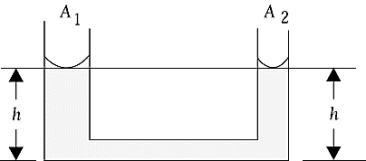 An open U-tube has water to a height h on both sides, as shown. The cross-sectional area of the left-hand tube is A1 = 1.50 cm2, and that of the right-hand tube is A2 = 0.50 cm2. A light oil which does not mix with water) with a density of 0.83 g/cm3 is added to the right-hand side. When equilibrium is reached, which of the following is correct?
An open U-tube has water to a height h on both sides, as shown. The cross-sectional area of the left-hand tube is A1 = 1.50 cm2, and that of the right-hand tube is A2 = 0.50 cm2. A light oil which does not mix with water) with a density of 0.83 g/cm3 is added to the right-hand side. When equilibrium is reached, which of the following is correct?A) The level on the right-hand side is higher than that on the left.
B) The level on the right-hand side is lower than that on the left.
C) The levels of the two sides are the same.
D) The difference in the heights depends on the ratio of A1 and A2.
E) The difference in the height depends on the difference between the areas.

Unlock Deck
Unlock for access to all 92 flashcards in this deck.
Unlock Deck
k this deck
15
The atmospheric pressure deceases exponentially with height. At 5.5 km, the pressure is half that at sea level. At what height is the pressure one eighth that of sea level?
A) 7.5 km
B) 11 km
C) 16.5 km
D) 22 km
E) 27.5 km
A) 7.5 km
B) 11 km
C) 16.5 km
D) 22 km
E) 27.5 km

Unlock Deck
Unlock for access to all 92 flashcards in this deck.
Unlock Deck
k this deck
16
A container of height, h, is filled with water of density and sealed with a flexible membrane. The container is placed in the space shuttle in orbit. If the air pressure in the shuttle is po, the pressure in the middle of the container is
A) "po."
B) "po + gh."
gh."
C) " gh."
gh."
D) " gh."
E) "depends how fast the shuttle is moving."
A) "po."
B) "po +
 gh."
gh."C) "
 gh."
gh."D) " gh."
E) "depends how fast the shuttle is moving."

Unlock Deck
Unlock for access to all 92 flashcards in this deck.
Unlock Deck
k this deck
17
If the atmosphere were compressed until it had the density of water, it would cover Earth to a depth of about
A) 0.81 km.
B) 4.6 m.
C) 1.6 km.
D) 76 cm.
E) 10 m.
A) 0.81 km.
B) 4.6 m.
C) 1.6 km.
D) 76 cm.
E) 10 m.

Unlock Deck
Unlock for access to all 92 flashcards in this deck.
Unlock Deck
k this deck
18
At what depth in seawater is the gauge pressure equal to 1 atm? The density of seawater is 1.03 * 103 kg/m3.
A) 5 m
B) 7.5 m
C) 10 m
D) 15 m
E) 20 m
A) 5 m
B) 7.5 m
C) 10 m
D) 15 m
E) 20 m

Unlock Deck
Unlock for access to all 92 flashcards in this deck.
Unlock Deck
k this deck
19
A penny has a mass of 3.0 g, a diameter of 1.9 cm, and a thickness of 0.15 cm. What is the density of the metal of which it is made?
A) 1.8 g/cm3
B) 3.4 g/cm3
C) 3.5 g/cm3
D) 7.1 g/cm3
E) 4.5 g/cm3
A) 1.8 g/cm3
B) 3.4 g/cm3
C) 3.5 g/cm3
D) 7.1 g/cm3
E) 4.5 g/cm3

Unlock Deck
Unlock for access to all 92 flashcards in this deck.
Unlock Deck
k this deck
20
A glass is filled with water. The gauge pressure at the top of the glass is zero and the gauge pressure at the bottom is P. A second glass with three times the height and twice the diameter is also filled with water. What is the pressure at the bottom of the second glass?
A) P
B) 2P
C) 3P
D) 3P/2
E) 3P/4
A) P
B) 2P
C) 3P
D) 3P/2
E) 3P/4

Unlock Deck
Unlock for access to all 92 flashcards in this deck.
Unlock Deck
k this deck
21
A small sphere of wood with a density = 0.40 g/cm3 is held at rest well under the surface of a pool of water. The magnitude of the initial acceleration of the sphere when it is released is
A) 15 m/s2.
B) 9.8 m/s2.
C) 33 m/s2.
D) 23 m/s2.
E) 3.4 m/s2.
A) 15 m/s2.
B) 9.8 m/s2.
C) 33 m/s2.
D) 23 m/s2.
E) 3.4 m/s2.

Unlock Deck
Unlock for access to all 92 flashcards in this deck.
Unlock Deck
k this deck
22
A stone of volume 1.42 *10-2 m3 lies at the bottom of a freshwater lake. If the rock's specific gravity is 3.5, the work required to lift it 1 m through the water is approximately
A) 487 J.
B) 139 J.
C) 348 J.
D) 223 J.
E) 469 J.
A) 487 J.
B) 139 J.
C) 348 J.
D) 223 J.
E) 469 J.

Unlock Deck
Unlock for access to all 92 flashcards in this deck.
Unlock Deck
k this deck
23
A tube with a radius of 4.2 cm is holding oil that has a density of 0.92 g/cm3. The gauge pressure in the oil at a depth of 64 cm from the top of the surface is
A) 5.8 *102 Pa.
B) 5.8 * 103 Pa.
C) 1.0 * 102 Pa.
D) 1.0 *106 Pa.
E) 1.7 * 103 Pa.
A) 5.8 *102 Pa.
B) 5.8 * 103 Pa.
C) 1.0 * 102 Pa.
D) 1.0 *106 Pa.
E) 1.7 * 103 Pa.

Unlock Deck
Unlock for access to all 92 flashcards in this deck.
Unlock Deck
k this deck
24
The force exerted by a stationary liquid on an inclined rectangular surface at rest in the liquid
A) acts normally to the surface.
B) is exerted equally at all points on the surface.
C) acts parallel to the surface.
D) is independent of the density of the liquid.
E) varies inversely as the depth.
A) acts normally to the surface.
B) is exerted equally at all points on the surface.
C) acts parallel to the surface.
D) is independent of the density of the liquid.
E) varies inversely as the depth.

Unlock Deck
Unlock for access to all 92 flashcards in this deck.
Unlock Deck
k this deck
25
 If the same fluid fills the containers shown, the pressures at the bases are related according to which of the following expressions?
If the same fluid fills the containers shown, the pressures at the bases are related according to which of the following expressions?A) pC < pA < pE < pD < pB
B) pE < pD < pC < pB < pA
C) pA < pB < pC < pD < pE
D) pE < pD = pC < pB < pA
E) pC < pD < pE < pC < pA

Unlock Deck
Unlock for access to all 92 flashcards in this deck.
Unlock Deck
k this deck
26
 The vessels in the figure contain liquids of the same density. The vessel that has the greatest pressure at its base is
The vessels in the figure contain liquids of the same density. The vessel that has the greatest pressure at its base isA) 1.
B) 2.
C) 3.
D) 4.
E) 5.

Unlock Deck
Unlock for access to all 92 flashcards in this deck.
Unlock Deck
k this deck
27
Two objects made of the same material but of different volumes have the same apparent weight when submerged in water. If they are placed in a vacuum,
A) both weigh less than before.
B) the one with the smaller volume weighs less than the other.
C) the one with the smaller volume weighs more than the other.
D) they weigh the same.
E) both weigh more than before.
A) both weigh less than before.
B) the one with the smaller volume weighs less than the other.
C) the one with the smaller volume weighs more than the other.
D) they weigh the same.
E) both weigh more than before.

Unlock Deck
Unlock for access to all 92 flashcards in this deck.
Unlock Deck
k this deck
28
Which of the following statements is NOT correct?
A) Negative gauge pressure means absolute pressure is below atmospheric.
B) Pressure in a fluid is caused by the impact of molecules.
C) In the same fluid in hydrostatic equilibrium, pressure at the same level is the same.
D) The pressure is proportional to the force the fluid exerts proportional to the object's surface.
E) Force exerted by a fluid on a surface is proportional to pressure and inversely proportional to surface area.
A) Negative gauge pressure means absolute pressure is below atmospheric.
B) Pressure in a fluid is caused by the impact of molecules.
C) In the same fluid in hydrostatic equilibrium, pressure at the same level is the same.
D) The pressure is proportional to the force the fluid exerts proportional to the object's surface.
E) Force exerted by a fluid on a surface is proportional to pressure and inversely proportional to surface area.

Unlock Deck
Unlock for access to all 92 flashcards in this deck.
Unlock Deck
k this deck
29
A block of ice 30.5 cm thick floating in fresh water just supports a man weighing 801 N. If the specific gravity of ice is 0.917, the smallest area the block can have is
A) 3.22 m2.
B) 3.57 m2.
C) 2.88 m2.
D) 1.45 m2.
E) 0.269 m2.
A) 3.22 m2.
B) 3.57 m2.
C) 2.88 m2.
D) 1.45 m2.
E) 0.269 m2.

Unlock Deck
Unlock for access to all 92 flashcards in this deck.
Unlock Deck
k this deck
30
If a column of liquid 52 cm high supports a column of mercury = 13.6 g/cm3) 10 cm high, the density of the liquid is
A) 6.0 g/cm3.
B) 2.6 g/cm3.
C) 3.8 g/cm3.
D) 4.9 g/cm3.
E) 5.0 g/cm3.
A) 6.0 g/cm3.
B) 2.6 g/cm3.
C) 3.8 g/cm3.
D) 4.9 g/cm3.
E) 5.0 g/cm3.

Unlock Deck
Unlock for access to all 92 flashcards in this deck.
Unlock Deck
k this deck
31
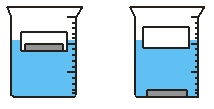 A beaker is filled with water. A small plastic container contains a solid bar of aluminum, which has a mass of 40 g, and is placed on the water so that it floats. The water level reads 60 ml. Next, the bar of aluminum is taken out of the container and placed in the water so that it sinks to the bottom. The water level in the beaker _____
A beaker is filled with water. A small plastic container contains a solid bar of aluminum, which has a mass of 40 g, and is placed on the water so that it floats. The water level reads 60 ml. Next, the bar of aluminum is taken out of the container and placed in the water so that it sinks to the bottom. The water level in the beaker _____A) drops.
B) stays unchanged.
C) rises.
D) depends on the type of container.
E) depends on the ratio of the density of aluminum to the density of the container.

Unlock Deck
Unlock for access to all 92 flashcards in this deck.
Unlock Deck
k this deck
32
According to Pascal's principle, the pressure at every point in a confined liquid
A) depends only on the density of the liquid.
B) is equal to the weight of the liquid.
C) is the same.
D) is changed the same amount by an externally applied pressure.
E) is equal to the externally applied pressure.
A) depends only on the density of the liquid.
B) is equal to the weight of the liquid.
C) is the same.
D) is changed the same amount by an externally applied pressure.
E) is equal to the externally applied pressure.

Unlock Deck
Unlock for access to all 92 flashcards in this deck.
Unlock Deck
k this deck
33
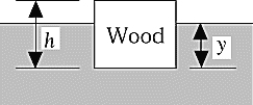 A piece of wood is floating at the surface of some water as illustrated. The wood has a circular cross section and a height h = 3.0 cm. The density of the wood is 0.41 g/cm3. The distance y from the surface of the water to the bottom of the wood is
A piece of wood is floating at the surface of some water as illustrated. The wood has a circular cross section and a height h = 3.0 cm. The density of the wood is 0.41 g/cm3. The distance y from the surface of the water to the bottom of the wood isA) 1.8 cm.
B) 0.81 cm.
C) 3.2 cm.
D) 1.2 cm.
E) 0.41 cm.

Unlock Deck
Unlock for access to all 92 flashcards in this deck.
Unlock Deck
k this deck
34
A solid wooden sphere of volume 0.0100 m3 floats freely exactly one-half submerged in a liquid of density 800 kg/m3. A lightweight cord is now tied to the sphere and is used to pull the sphere under the surface and hold it completely submerged. What is the tension in the cord?
A)0 N
B) 2.00 N
C) 39.2 N
D) 4.00 N
E) 8.4 N
A)0 N
B) 2.00 N
C) 39.2 N
D) 4.00 N
E) 8.4 N

Unlock Deck
Unlock for access to all 92 flashcards in this deck.
Unlock Deck
k this deck
35
A flat plate with a negligible mass and an area of 1.0 cm2 is placed in a horizontal position well beneath the surface in a liquid that is not moving. The pressure at the location of the plate is p Pa. The total force that arises from the pressure of the liquid on this plate is
A) P N, directed down.
B) P × 10-4 N, directed down.
C) P N, directed up.
D) P × 10-4 N, directed up.
E) zero.
A) P N, directed down.
B) P × 10-4 N, directed down.
C) P N, directed up.
D) P × 10-4 N, directed up.
E) zero.

Unlock Deck
Unlock for access to all 92 flashcards in this deck.
Unlock Deck
k this deck
36
A ball bearing that has a density of 5.16 g/cm3 is held at rest under the surface of a liquid that has a density of 2.50 g/cm3. The magnitude of the acceleration of the ball bearing just after it is released is
A) 5.0 m/s2.
B) 14 m/s2.
C) 10 m/s2.
D) 6.5 m/s2.
E) 1.6 m/s2.
A) 5.0 m/s2.
B) 14 m/s2.
C) 10 m/s2.
D) 6.5 m/s2.
E) 1.6 m/s2.

Unlock Deck
Unlock for access to all 92 flashcards in this deck.
Unlock Deck
k this deck
37
Pressure as a function of depth for a certain liquid is plotted on the graph. What is the density of the liquid? 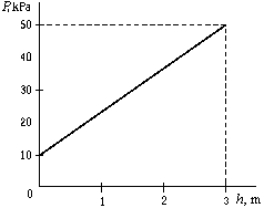
A) 1.76 g/cm3
B) 1.36 g/cm3
C) 0.340 g/cm3
D) 1.70 g/cm3
E) 3.27 g/cm3

A) 1.76 g/cm3
B) 1.36 g/cm3
C) 0.340 g/cm3
D) 1.70 g/cm3
E) 3.27 g/cm3

Unlock Deck
Unlock for access to all 92 flashcards in this deck.
Unlock Deck
k this deck
38
A block of wood of relative density 0.750, cross-sectional area of 30.5 cm *40.6 cm, and 20.3 cm thick is tossed into a choppy freshwater lake. After a reasonable time, the approximate vertical dimension above the water will be
A) 2.54 cm.
B) 5.08 cm.
C) 7.62 cm.
D) 10.2 cm.
E) 12.7 cm.
A) 2.54 cm.
B) 5.08 cm.
C) 7.62 cm.
D) 10.2 cm.
E) 12.7 cm.

Unlock Deck
Unlock for access to all 92 flashcards in this deck.
Unlock Deck
k this deck
39
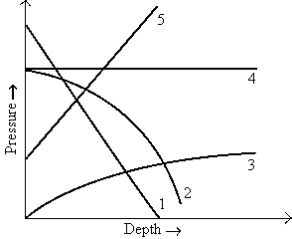 Which curve best represents the variation in pressure with depth in a fluid, assuming constant density?
Which curve best represents the variation in pressure with depth in a fluid, assuming constant density?A) 1
B) 2
C) 3
D) 4
E) 5

Unlock Deck
Unlock for access to all 92 flashcards in this deck.
Unlock Deck
k this deck
40
Two pistons of a hydraulic lift have radii of 2.67 cm and 20.0 cm, respectively. The downward force on the 2.67-cm piston that is required to lift a mass of 2000 kg supported by the 20-cm piston is
A) 350 N.
B) 270 N.
C) 36 N.
D) 1.5* 103 N.
E) 2.6 * 103 N.
A) 350 N.
B) 270 N.
C) 36 N.
D) 1.5* 103 N.
E) 2.6 * 103 N.

Unlock Deck
Unlock for access to all 92 flashcards in this deck.
Unlock Deck
k this deck
41
 A beaker is filled with water. A ball of mass m and density < water is tied to a string. The other end of the string is then tied to the bottom of the beaker so that the ball is completely submerged. When the string is cut, the acceleration of the ball is
A beaker is filled with water. A ball of mass m and density < water is tied to a string. The other end of the string is then tied to the bottom of the beaker so that the ball is completely submerged. When the string is cut, the acceleration of the ball isA)
 .
.B)
 .
.C) g.
D)
 .
.E)
 .
.
Unlock Deck
Unlock for access to all 92 flashcards in this deck.
Unlock Deck
k this deck
42
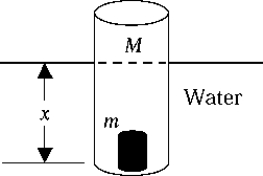 A cylindrical piece of wood has a mass M = 0.235 kg. A small piece of lead with a mass m = 0.021 kg is fixed in the wood at the bottom of the cylinder so that the cylinder floats in water in a stable position, as shown. The radius of the cylinder is 1.65 cm. The depth x of the cylinder below the surface of the water is
A cylindrical piece of wood has a mass M = 0.235 kg. A small piece of lead with a mass m = 0.021 kg is fixed in the wood at the bottom of the cylinder so that the cylinder floats in water in a stable position, as shown. The radius of the cylinder is 1.65 cm. The depth x of the cylinder below the surface of the water isA) 0.38 m.
B) 0.57 m.
C) 0.22 m.
D) 0.42 m.
E) 0.30 m.

Unlock Deck
Unlock for access to all 92 flashcards in this deck.
Unlock Deck
k this deck
43
 A large tub is half full of water. A mass M = 25.0 kg, which has a specific gravity of 2.5, is attached to the right-hand side of the tub, out of the water. The entire apparatus balances perfectly horizontally on a fulcrum at F, as in a). The tub is clamped in place and M is lowered to the bottom, completely submerged, as in b). When the clamps are removed, the tub
A large tub is half full of water. A mass M = 25.0 kg, which has a specific gravity of 2.5, is attached to the right-hand side of the tub, out of the water. The entire apparatus balances perfectly horizontally on a fulcrum at F, as in a). The tub is clamped in place and M is lowered to the bottom, completely submerged, as in b). When the clamps are removed, the tubA) remains balanced.
B) tips, with point L going down.
C) tips, with point L going up.
D) starts oscillating.
E) behavior depends on mass and volume of mass M.

Unlock Deck
Unlock for access to all 92 flashcards in this deck.
Unlock Deck
k this deck
44
A rock of mass M, that has a density equal to 150% that of water, is suspended in water by a thin, massless cord. The tension in the cord is
A) 2Mg.
B) Mg.
C) 4Mg.
D) zero.
E) 3Mg.
A) 2Mg.
B) Mg.
C) 4Mg.
D) zero.
E) 3Mg.

Unlock Deck
Unlock for access to all 92 flashcards in this deck.
Unlock Deck
k this deck
45
A large spherical air balloon is filled with helium. If the balloon is to lift three people, each approximately 80 kg, plus a basket and balloon outer covering material of mass 50 kg, calculate the minimum radius of the balloon. Assume values of the density of air and helium to be 1.29 kg/m3 and 0.18 kg/m3 respectively.
A) 62 m
B) 8.0 m
C) 4.0 m
D) 20 m
E) 5.0 m
A) 62 m
B) 8.0 m
C) 4.0 m
D) 20 m
E) 5.0 m

Unlock Deck
Unlock for access to all 92 flashcards in this deck.
Unlock Deck
k this deck
46
You are floating in a boat in a swimming pool. The boat contains some blocks of wood. The specific gravity of the wood is 0.66. You throw the wood blocks into the pool. When the waves settle, the depth of the water in the pool
A) has increased.
B) is the same as before.
C) has decreased.
D) depends on the volume of the boat.
E) depends on the ratio of specific gravities of wood and boat.
A) has increased.
B) is the same as before.
C) has decreased.
D) depends on the volume of the boat.
E) depends on the ratio of specific gravities of wood and boat.

Unlock Deck
Unlock for access to all 92 flashcards in this deck.
Unlock Deck
k this deck
47
An adventurer builds a 1.80 m3 raft made out of cherry wood CHERRY = 800 kg/m3) and places it in the seawater SEAWATER = 1030 kg/m3). Determine the volume of the Styrofoam STYROFOAM = 32.0 kg/m3) that would have to be attached to the bottom of the raft so only half of the raft's volume is submerged in the water.
A) 0.721 m3
B) 0.699 m3
C) 0.514 m3
D) 0.498 m3
E) 0.0072 m3
A) 0.721 m3
B) 0.699 m3
C) 0.514 m3
D) 0.498 m3
E) 0.0072 m3

Unlock Deck
Unlock for access to all 92 flashcards in this deck.
Unlock Deck
k this deck
48
A block of wood of mass 400 g and density 0.8 g/cm3 is floating on the surface of a liquid of density 1.3 g/cm3. What is the difference in mass of stone density = 1.9 g/cm3) that must be added to the block in order for the combination wood and stone) to be just submerged rather than only the wood to be submerged?
A) 250 g
B) 540 g
C) 170 g
D) 790 g
E) 290 g
A) 250 g
B) 540 g
C) 170 g
D) 790 g
E) 290 g

Unlock Deck
Unlock for access to all 92 flashcards in this deck.
Unlock Deck
k this deck
49
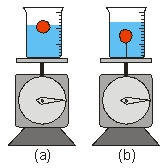 Two identical beakers are filled with the same amount of water. A ball of mass m is placed in the first beaker so that it floats on the surface while a second identical ball is placed in the second beaker but tied with a string of negligible mass so that the ball is completely submerged. Each beaker is then placed on a scale. Which scale has a higher reading?
Two identical beakers are filled with the same amount of water. A ball of mass m is placed in the first beaker so that it floats on the surface while a second identical ball is placed in the second beaker but tied with a string of negligible mass so that the ball is completely submerged. Each beaker is then placed on a scale. Which scale has a higher reading?A) a
B) b
C) the same
D) depends on how deep the ball is submerged in b
E) depends on the mass of the ball

Unlock Deck
Unlock for access to all 92 flashcards in this deck.
Unlock Deck
k this deck
50
A cone with height h = 15.0 cm and bottom area of 7.85 × 10-3 m2 is placed in the container filled with seawater SW = 1030 kg/m3) and oil OIL = 790 kg/m3) so that the bottom of the cone is in seawater and its tip is in oil. What is the average density of the cone if the line between the fluids crosses through the midpoint between the bottom and the tip of the cone? 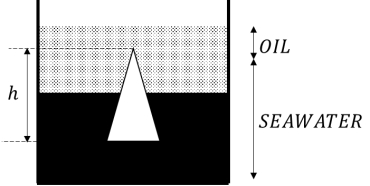
A) 820 kg/m3
B) 850 kg/m3
C) 910 kg/m3
D) 970 kg/m3
E) 1000 kg/m3

A) 820 kg/m3
B) 850 kg/m3
C) 910 kg/m3
D) 970 kg/m3
E) 1000 kg/m3

Unlock Deck
Unlock for access to all 92 flashcards in this deck.
Unlock Deck
k this deck
51
A metal block suspended from a spring balance is submerged in water. You observe that the block displaces 55 cm3 of water and that the balance reads 4.3 N. What is the density of the block?
A) 7.0 g/ cm3
B) 8.0 g/cm3
C) 9.0 g/cm3
D) 1.1 g/cm3
E) 1.2 g/cm3
A) 7.0 g/ cm3
B) 8.0 g/cm3
C) 9.0 g/cm3
D) 1.1 g/cm3
E) 1.2 g/cm3

Unlock Deck
Unlock for access to all 92 flashcards in this deck.
Unlock Deck
k this deck
52
A block of wood of mass 300 g and density 0.75 g/cm3 is floating on the surface of a liquid of density 1.1 g/cm3. What mass of lead density = 11.3 g/cm3) must be added to the block in order for the combination just to be submerged?
A) 440 g
B) 820 g
C) 140 g
D) 155 g
E) 25 g
A) 440 g
B) 820 g
C) 140 g
D) 155 g
E) 25 g

Unlock Deck
Unlock for access to all 92 flashcards in this deck.
Unlock Deck
k this deck
53
A rock of mass M with a density twice that of water is sitting on the bottom of an aquarium tank filled with water. The normal force exerted on the rock by the bottom of the tank is
A) 2Mg.
B) Mg.
C) Mg/2.
D) zero.
E) 3Mg.
A) 2Mg.
B) Mg.
C) Mg/2.
D) zero.
E) 3Mg.

Unlock Deck
Unlock for access to all 92 flashcards in this deck.
Unlock Deck
k this deck
54
A raft of density 700 kg/m3 has a surface area of 7.0 m2 and a volume of 0.7 m3. At what depth does it sink into water of density 1000 kg/m3?
A) 10 cm
B) 0.7 cm
C) 0.7 m
D) 7 m
E) 7 cm
A) 10 cm
B) 0.7 cm
C) 0.7 m
D) 7 m
E) 7 cm

Unlock Deck
Unlock for access to all 92 flashcards in this deck.
Unlock Deck
k this deck
55
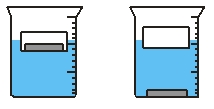 A beaker is filled with water. A small plastic container contains a solid bar of aluminum, which has a mass of 40 g, and is placed on the water so that it floats. The water level reads 60 ml. Next, the bar of aluminum is taken out of the container and placed in the water so that it sinks to the bottom. By how much does the water level change? Density of Al is 2.7 g/cm3.)
A beaker is filled with water. A small plastic container contains a solid bar of aluminum, which has a mass of 40 g, and is placed on the water so that it floats. The water level reads 60 ml. Next, the bar of aluminum is taken out of the container and placed in the water so that it sinks to the bottom. By how much does the water level change? Density of Al is 2.7 g/cm3.)A) +40.0 ml
B) -40.0 ml
C) -25.2 ml
D) 0 ml
E) +25.2 ml

Unlock Deck
Unlock for access to all 92 flashcards in this deck.
Unlock Deck
k this deck
56
A uniform cylinder of wood of length 25 cm is floating vertically upright in a dual layered fluid. An oil layer of density 0.90 g/cm3) that is 9.0 cm deep lies above a depth of water. If only 5.0 cm of wood lies above the oil surface, calculate the density of the wood. 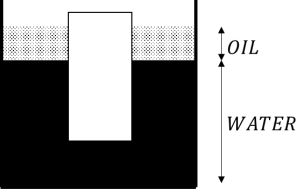
A) 0.76 g/cm3
B) 0.80 g/cm3
C) 0.70 g/cm3
D) 0.66 g/cm3
E) 0.95 g/cm3

A) 0.76 g/cm3
B) 0.80 g/cm3
C) 0.70 g/cm3
D) 0.66 g/cm3
E) 0.95 g/cm3

Unlock Deck
Unlock for access to all 92 flashcards in this deck.
Unlock Deck
k this deck
57
A rock is thrown into a swimming pool that is filled with water at a uniform temperature. Which of the following statements is true?
A) The buoyant force on the rock is zero as it sinks.
B) The buoyant force on the rock increases as it sinks.
C) The buoyant force on the rock decreases as it sinks.
D) The buoyant force on the rock is constant as it sinks.
E) The buoyant force on the rock as it sinks is nonzero at first but becomes zero once the terminal velocity is reached.
A) The buoyant force on the rock is zero as it sinks.
B) The buoyant force on the rock increases as it sinks.
C) The buoyant force on the rock decreases as it sinks.
D) The buoyant force on the rock is constant as it sinks.
E) The buoyant force on the rock as it sinks is nonzero at first but becomes zero once the terminal velocity is reached.

Unlock Deck
Unlock for access to all 92 flashcards in this deck.
Unlock Deck
k this deck
58
An object of irregular shape is placed into the container filled by glycerol glycerol = 1250 kg/m3) and mineral oil oil = 900 kg/m3). It sinks so that 60% of the object is submerged in glycerol. What is the density of the object?
A) 750 kg/m3
B) 1110 kg/m3
C) 1075 kg/m3
D) 1500 kg/m3
E) 1000 kg/m3
A) 750 kg/m3
B) 1110 kg/m3
C) 1075 kg/m3
D) 1500 kg/m3
E) 1000 kg/m3

Unlock Deck
Unlock for access to all 92 flashcards in this deck.
Unlock Deck
k this deck
59
You are floating in a boat in a swimming pool. There are some large stones, with a density of 2.5 g/cm3, in the boat. You throw the stones out of the boat and they sink to the bottom of the pool. The water level h, measured vertically at the end of the pool __________ as the stones are thrown out.
A) decreases
B) increases
C) changes depending on the ratio of Vrocks/ Vboat
D) stays the same
E) starts oscillating
A) decreases
B) increases
C) changes depending on the ratio of Vrocks/ Vboat
D) stays the same
E) starts oscillating

Unlock Deck
Unlock for access to all 92 flashcards in this deck.
Unlock Deck
k this deck
60
A block of wood of length L = 21.0 cm, width w = 9.53 cm, and height h = 5.92 cm is just barely immersed in water by placing a mass m on the top of the block. The density of the wood is = 0.390 g/cm3. The value of m is
A) 0.72 kg.
B) 7.1 kg.
C) 1.2 kg.
D) 1.6 kg.
E) 0.36 kg.
A) 0.72 kg.
B) 7.1 kg.
C) 1.2 kg.
D) 1.6 kg.
E) 0.36 kg.

Unlock Deck
Unlock for access to all 92 flashcards in this deck.
Unlock Deck
k this deck
61
Seawater of density 1.03 *103 kg/m3 is in streamline flow through a Venturi meter. The pressure difference between the main pipe and the constriction is 20.7 kPa, and the flow velocity in the constriction is 7.32 m/s. The flow velocity in the main pipe is
A) 2.44 m/s.
B) 3.66 m/s.
C) 7.32 m/s.
D) 14.6 m/s.
E) 29.3 m/s.
A) 2.44 m/s.
B) 3.66 m/s.
C) 7.32 m/s.
D) 14.6 m/s.
E) 29.3 m/s.

Unlock Deck
Unlock for access to all 92 flashcards in this deck.
Unlock Deck
k this deck
62
Bernoulli's equation for nonviscous flow can be stated as p1 + gy1 +  v12 = p2 + gy2 +
v12 = p2 + gy2 +  v22
v22
A fluid is flowing through a horizontal tube that changes in cross-sectional area from
A1 = 0.75 cm2 to A2 = 0.030 cm2. When v1 = 3.5 cm/s, = 1.4 g/cm3, and viscosity is neglected, the difference between pressure p2 at A2 and p1 at A1 is
When v1 = 3.5 cm/s, = 1.4 g/cm3, and viscosity is neglected, the difference between pressure p2 at A2 and p1 at A1 is
A) 54 *103 dyn/cm2, with P1 higher.
B) 59 dyn/cm2, with P2 higher.
C) 59 dyn/cm2, with P1 higher.
D) 8.3 * 102 dyn/cm2, with P2 higher.
E) 5.4 * 103 dyn/cm2, with P1 higher.
 v12 = p2 + gy2 +
v12 = p2 + gy2 +  v22
v22A fluid is flowing through a horizontal tube that changes in cross-sectional area from
A1 = 0.75 cm2 to A2 = 0.030 cm2.
 When v1 = 3.5 cm/s, = 1.4 g/cm3, and viscosity is neglected, the difference between pressure p2 at A2 and p1 at A1 is
When v1 = 3.5 cm/s, = 1.4 g/cm3, and viscosity is neglected, the difference between pressure p2 at A2 and p1 at A1 isA) 54 *103 dyn/cm2, with P1 higher.
B) 59 dyn/cm2, with P2 higher.
C) 59 dyn/cm2, with P1 higher.
D) 8.3 * 102 dyn/cm2, with P2 higher.
E) 5.4 * 103 dyn/cm2, with P1 higher.

Unlock Deck
Unlock for access to all 92 flashcards in this deck.
Unlock Deck
k this deck
63
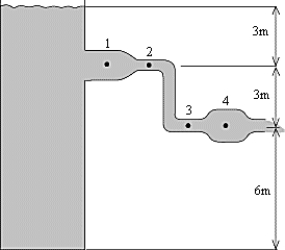 Water is discharged from the tank in the manner shown. At which point is the pressure the smallest?
Water is discharged from the tank in the manner shown. At which point is the pressure the smallest?A) 1
B) 2
C) 3
D) 4
E) The pressure is the same at all points.

Unlock Deck
Unlock for access to all 92 flashcards in this deck.
Unlock Deck
k this deck
64
A horizontal pipe of 30.0 cm2 cross-sectional area carries water at a speed of 2.5 m/s. This pipe feeds a smaller pipe of cross section 10.0 cm2. Find the speed of water flow in the smaller pipe.
A) 3.5 m/s
B) 0.8 m/s
C) 2.5 m/s
D) 7.5 m/s
E) 23 m/s
A) 3.5 m/s
B) 0.8 m/s
C) 2.5 m/s
D) 7.5 m/s
E) 23 m/s

Unlock Deck
Unlock for access to all 92 flashcards in this deck.
Unlock Deck
k this deck
65
The drag force on a plane is proportional to the density of the air. By what factor does the drag force change if a plane goes from an altitude 5.5 km to 11 km? The atmospheric pressure goes from  to
to  atm in going from 5.5 km to 11 km. Assume that the plane is at level flight and flies at the same speed.
atm in going from 5.5 km to 11 km. Assume that the plane is at level flight and flies at the same speed.
A)
B)
C)
D) 1
E) 2
 to
to  atm in going from 5.5 km to 11 km. Assume that the plane is at level flight and flies at the same speed.
atm in going from 5.5 km to 11 km. Assume that the plane is at level flight and flies at the same speed.A)

B)

C)

D) 1
E) 2

Unlock Deck
Unlock for access to all 92 flashcards in this deck.
Unlock Deck
k this deck
66
A pipe of 2.54 cm inside diameter has a constriction in which the inside diameter is 1.27 cm. If water is flowing through this pipe with a velocity of 1.22 m/s in the main section, the velocity in the constricted section is
A) 0.305 m/s.
B) 0.610 m/s.
C) 2.44 m/s.
D) 1.22 m/s.
E) 4.88 m/s.
A) 0.305 m/s.
B) 0.610 m/s.
C) 2.44 m/s.
D) 1.22 m/s.
E) 4.88 m/s.

Unlock Deck
Unlock for access to all 92 flashcards in this deck.
Unlock Deck
k this deck
67
Which conservation law governs the Bernoulli's equation?
A) Conservation of energy
B) Conservation of linear momentum
C) Conservation of angular momentum
D) Newton's universal law of gravitation
E) Conservation of electric charge
A) Conservation of energy
B) Conservation of linear momentum
C) Conservation of angular momentum
D) Newton's universal law of gravitation
E) Conservation of electric charge

Unlock Deck
Unlock for access to all 92 flashcards in this deck.
Unlock Deck
k this deck
68
A fish model that is 5.08 cm in diameter is placed in a pipe 25.4 cm in diameter and aligned along the axis of the pipe. If the water must flow past the fish at 2.44 m/s, the water in the unconstricted part of the pipe must flow at
A) 9.75 cm/s.
B) 2.84 m/s.
C) 2.35 m/s.
D) 2.44 m/s.
E) 6.10 m/s.
A) 9.75 cm/s.
B) 2.84 m/s.
C) 2.35 m/s.
D) 2.44 m/s.
E) 6.10 m/s.

Unlock Deck
Unlock for access to all 92 flashcards in this deck.
Unlock Deck
k this deck
69
A horizontal pipe narrows from a diameter of 10.0 to 5.0 cm. For a nonviscous fluid flowing from the larger diameter to the smaller,
A) the velocity and pressure both increase.
B) the velocity increases and the pressure decreases.
C) the velocity decreases and the pressure increases.
D) the velocity and pressure both decrease.
E) either the velocity or the pressure changes but not both.
A) the velocity and pressure both increase.
B) the velocity increases and the pressure decreases.
C) the velocity decreases and the pressure increases.
D) the velocity and pressure both decrease.
E) either the velocity or the pressure changes but not both.

Unlock Deck
Unlock for access to all 92 flashcards in this deck.
Unlock Deck
k this deck
70
![<strong> A tank is filled with water to a height H. A small hole is punched in one of the walls at a depth h below the water's surface. The water leaves the hole in a horizontal direction. The stream of water strikes the floor at a distance x, as shown. Neglecting viscosity, you can calculate the value of x from</strong> A) x = H - h. B) x = [2hH - h)]<sup>1/2</sup>. C) x = h. D) x = 2[hH - h)]<sup>1/2</sup>. E) x = Hh/H-h).](https://storage.examlex.com/TB7291/11eb1367_5144_6d07_8021_4f47b6e7be0c_TB7291_00.jpg) A tank is filled with water to a height H. A small hole is punched in one of the walls at a depth h below the water's surface. The water leaves the hole in a horizontal direction. The stream of water strikes the floor at a distance x, as shown. Neglecting viscosity, you can calculate the value of x from
A tank is filled with water to a height H. A small hole is punched in one of the walls at a depth h below the water's surface. The water leaves the hole in a horizontal direction. The stream of water strikes the floor at a distance x, as shown. Neglecting viscosity, you can calculate the value of x fromA) x = H - h.
B) x = [2hH - h)]1/2.
C) x = h.
D) x = 2[hH - h)]1/2.
E) x = Hh/H-h).

Unlock Deck
Unlock for access to all 92 flashcards in this deck.
Unlock Deck
k this deck
71
Water from a tap is flowing at a uniform rate of 24 cm3/s into a cylindrical container. An exit tube is mounted on the side of the container at height h/2 from the base. The height h of the water remains constant. The volume flow at which the water leaves the container is
A) 12 cm3/s.
B) 24 cm3/s.
C) 36 cm3/s.
D) 48 cm3/s.
E) 72 cm3/s.
A) 12 cm3/s.
B) 24 cm3/s.
C) 36 cm3/s.
D) 48 cm3/s.
E) 72 cm3/s.

Unlock Deck
Unlock for access to all 92 flashcards in this deck.
Unlock Deck
k this deck
72
Cities across the U.S. supply fresh water to the residents at constant pressure by the use of water towers. If the diameter, d2, of the pipe coming out of the tower is 25.0 cm, and the diameter, d1, of the pipe at your home is 2.00 cm, what is the ratio of the velocity of the water at d1 compared to d2? Assume that all the taps are off except yours.
A) 12.5
B) 156
C) 0.0064
D) 0.08
E) 25
A) 12.5
B) 156
C) 0.0064
D) 0.08
E) 25

Unlock Deck
Unlock for access to all 92 flashcards in this deck.
Unlock Deck
k this deck
73
Water flows at speed v in a pipe of radius r. Neglecting viscosity, at what speed does the water flow through a constriction in which the radius of the pipe is r/3?
A) v/9
B) v/3
C) v
D) 3v
E) 9v
A) v/9
B) v/3
C) v
D) 3v
E) 9v

Unlock Deck
Unlock for access to all 92 flashcards in this deck.
Unlock Deck
k this deck
74
One statement of Bernoulli's law is: At any two points along a pipe in which there is a liquid in steady flow, the sum of the pressure, the kinetic energy per unit volume, and the potential energy per unit volume has the same value.For this statement to be true, it is not necessary to have
A) streamline flow.
B) frictionless flow.
C) an incompressible fluid.
D) fluid of constant density.
E) constant acceleration of the fluid between the two points.
A) streamline flow.
B) frictionless flow.
C) an incompressible fluid.
D) fluid of constant density.
E) constant acceleration of the fluid between the two points.

Unlock Deck
Unlock for access to all 92 flashcards in this deck.
Unlock Deck
k this deck
75
Seawater of density 1.03 *103 kg/m3 is in streamline flow through a Venturi meter. The cross-sectional areas of the main pipe and the constriction are 0.139 m2 and 0.0464 m2, respectively, and the pressure difference between the two portions is 55.2 kPa. The velocity of flow in the main pipe is
A) 0.305 m/s.
B) 1.73 m/s.
C) 3.66 m/s.
D) 11.0 m/s.
E) 20.7 m/s.
A) 0.305 m/s.
B) 1.73 m/s.
C) 3.66 m/s.
D) 11.0 m/s.
E) 20.7 m/s.

Unlock Deck
Unlock for access to all 92 flashcards in this deck.
Unlock Deck
k this deck
76
When Bernoulli's equation is written in the form p/ +  v2 + U = C,
v2 + U = C,
The constant C represents the
A) energy per unit mass.
B) energy per unit volume.
C) net work done by outside forces.
D) power supplied by outside sources.
E) mass flow per unit time.
 v2 + U = C,
v2 + U = C,The constant C represents the
A) energy per unit mass.
B) energy per unit volume.
C) net work done by outside forces.
D) power supplied by outside sources.
E) mass flow per unit time.

Unlock Deck
Unlock for access to all 92 flashcards in this deck.
Unlock Deck
k this deck
77
A small portion of an incompressible liquid in steady flow through a pipe of variable cross section, if friction is negligible, has at each point throughout its path a constant
A) kinetic energy.
B) velocity.
C) potential energy.
D) total energy.
E) momentum.
A) kinetic energy.
B) velocity.
C) potential energy.
D) total energy.
E) momentum.

Unlock Deck
Unlock for access to all 92 flashcards in this deck.
Unlock Deck
k this deck
78
A wind with speed 45 m/s blows across a roof 20 m long and 12 m wide. The pressure inside the room is 1 atm. What is the net force on this roof due to the pressure difference inside and outside the roof? The density of air is equal to 1.3 kg/m3.)
A) 3.2 * 105 N
B) 2.4 *107 N
C) 6.3 * 105 N
D) 7.0 * 103 N
E) 3.2 * 108 N
A) 3.2 * 105 N
B) 2.4 *107 N
C) 6.3 * 105 N
D) 7.0 * 103 N
E) 3.2 * 108 N

Unlock Deck
Unlock for access to all 92 flashcards in this deck.
Unlock Deck
k this deck
79
An air-conditioning system is designed to fill a room of 10.0 m * 8.0 m * 6.0 m with fresh air every 20 minutes. If the circular air duct has a radius of 13 cm, calculate the speed of airflow in the duct.
A) 30.0 m/s
B) 450 m/s
C) 2.4 m/s
D) 7.5 m/s
E) 1.0 m/s
A) 30.0 m/s
B) 450 m/s
C) 2.4 m/s
D) 7.5 m/s
E) 1.0 m/s

Unlock Deck
Unlock for access to all 92 flashcards in this deck.
Unlock Deck
k this deck
80
 The figure represents the streamline flow of an incompressible fluid. Which of the following statements is true of the velocity and/or pressure at the indicated points?
The figure represents the streamline flow of an incompressible fluid. Which of the following statements is true of the velocity and/or pressure at the indicated points?A) vA = vB = vC
B) vA = vB = vC; pA pB pC
C) vA vB vC; pA = pB = pC
D) vA vB vC; pA pB pC
E) vA = vB = vC; pA > pB > pC

Unlock Deck
Unlock for access to all 92 flashcards in this deck.
Unlock Deck
k this deck


